小学英语学习计划表
小学生英语学习计划表
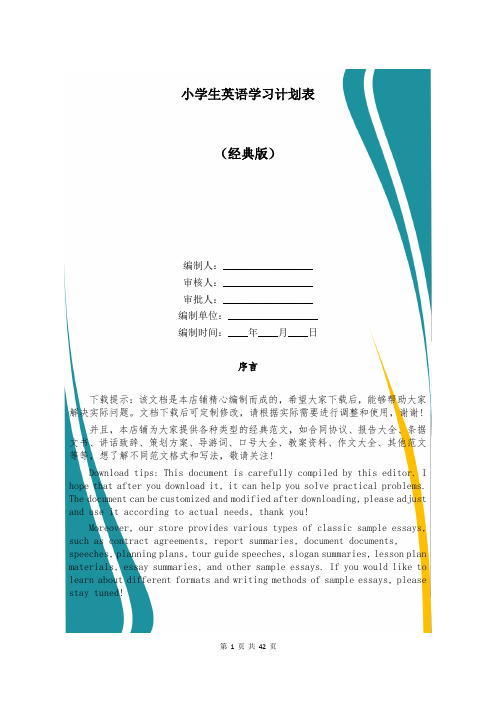
小学生英语学习计划表(经典版)编制人:__________________审核人:__________________审批人:__________________编制单位:__________________编制时间:____年____月____日序言下载提示:该文档是本店铺精心编制而成的,希望大家下载后,能够帮助大家解决实际问题。
文档下载后可定制修改,请根据实际需要进行调整和使用,谢谢!并且,本店铺为大家提供各种类型的经典范文,如合同协议、报告大全、条据文书、讲话致辞、策划方案、导游词、口号大全、教案资料、作文大全、其他范文等等,想了解不同范文格式和写法,敬请关注!Download tips: This document is carefully compiled by this editor. I hope that after you download it, it can help you solve practical problems. The document can be customized and modified after downloading, please adjust and use it according to actual needs, thank you!Moreover, our store provides various types of classic sample essays, such as contract agreements, report summaries, document documents, speeches, planning plans, tour guide speeches, slogan summaries, lesson plan materials, essay summaries, and other sample essays. If you would like to learn about different formats and writing methods of sample essays, please stay tuned!小学生英语学习计划表小学生英语学习计划表(通用20篇)小学生英语学习计划表篇1一、复习目的期末临近,为了帮助学生对所学英语知识进行归纳和总结,加深学生对所学二十六个字母,词汇、日常用语、句型的理解和记忆,提高期末考试成绩,为学生后续学习奠定较为坚实的基础,特制定此学习计划、二、复习内容1、二十六个英文字母的正确认读2、二十六个英文字母的规范书写3、三会,四会单词的认读4、课文重点句型的理解,认读5、语言学习的正确灵活运用三、复习措施(一)复习字母,人人过关本学期学习的二十六个英文字母是重点部分,首先要求学生能够正确认读,其次,要求学生能够按照正确格式书写单词,因此在复习时候,我准备采用人人过关的形式,由我来检查学生一个个的认读和书写,力求基础知识人人过关。
小学四年级暑假英语学习计划时间表模板

小学四年级暑假英语学习计划时间表模板Summer Vacation English Learning Plan Template for Fourth GradeSummer vacation is a great time for fourth graders to improve their English skills in a fun and interactive way. This template will provide a structured plan for students to follow during their break, ensuring they continue to enhance their language abilities even when school is out of session.Week 1: Review and PracticeMonday-Friday:- Review key grammar points such as verb tenses, articles, and prepositions.- Practice writing short sentences or paragraphs on different topics.- Work on spelling and vocabulary through flashcards or online games.Week 2: Reading ComprehensionMonday-Friday:- Read a short story or article each day and answer comprehension questions.- Practice summarizing the main ideas and details of the text.- Explore different genres such as fiction, non-fiction, poetry, and more.Week 3: Listening and SpeakingMonday-Friday:- Listen to English songs, podcasts, or audiobooks and try to understand the content.- Practice speaking by recording yourself reading a passage or retelling a story.- Have conversations with family members or friends in English.Week 4: Writing SkillsMonday-Friday:- Write a daily journal entry about your activities, thoughts, or feelings.- Practice writing different types of texts such as emails, letters, or short stories.- Edit and revise your writing for grammar, punctuation, and clarity.Week 5: Vocabulary ExpansionMonday-Friday:- Learn new words and phrases through word games, puzzles, or flashcards.- Use the new vocabulary in sentences or conversations to reinforce understanding.- Create a word bank or vocabulary journal to track your progress.Week 6: Review and AssessmentMonday-Friday:- Review all the topics covered during the summer vacation.- Take a self-assessment quiz to test your knowledge and skills.- Set goals for further improvement and create a plan for ongoing English practice.By following this structured English learning plan, fourth graders can make the most of their summer vacation andcontinue to grow their language abilities in a meaningful way. Remember to make learning fun and engaging by incorporating games, activities, and real-life experiences into your study routine. Enjoy your summer break and happy learning!。
小学四升五英语暑假学习计划表

小学四升五英语暑假学习计划表English:During the summer vacation between fourth and fifth grade, it is important for students to continue practicing their English skills in order to maintain and improve their proficiency. A proper study plan should include a mix of reading, writing, listening, and speaking activities. To improve reading skills, students can choose a variety of age-appropriate books, both fiction and non-fiction, and set a goal to finish a certain number of books by the end of the summer. Writing practice can involve keeping a journal, writing stories, or even writing letters to pen pals. Listening skills can be improved by watching English movies or TV shows, listening to English music, or even podcasts meant for children. Speaking practice can include conversations with family members or friends in English, participating in English-speaking clubs or camps, or even recording themselves speaking and listening to the playback for self-correction. By dedicating a certain amount of time each day to these different activities, students can make significant progress in their English skills over the summer break.中文翻译:在小学四年级和五年级之间的暑假期间,学生继续练习英语技能以保持和提高他们的熟练程度非常重要。
小学英语单元学习计划表

小学英语单元学习计划表小学生刚刚接触英语,正是处于英语学习的启蒙阶段,那么想要尽快让孩子跟上学习进度,激发孩子的英语学习兴趣,教师应该为孩子们做好学习计划。
一起来看看店铺整理的小学英语单元学习计划表,希望对您有用。
小学英语单元学习计划表一本册教材的知识要求是掌握一定量的词汇,二十多个基本句子结构和一定量的日常交际用语,包括:"向新学生介绍老师、同学","根据特征认人","谈论人物","认物","邀请别人外出","征求别人意见"及"询问价格","介绍教室","确定位置"。
其中一部分与前几册课文有间接或直接的联系。
1 新授单元由七个板块组成:第一部分是Read and say情景对话板块。
该板块通过情景会话,着重训练学生的听说技能,提高会话能力。
第二部分是Look read and learn,主要呈现词汇。
第三、四板块中的句型是每个单元的教学重点。
Read and act的任务是培养学生初步的语感、阅读能力和良好的朗读习惯。
Listen and repeat 是语音训练板块。
Fun house是一个活动板块。
2 经过一年半的学习,学生已有一定的英语基础,渴望通过新学期的学习获得更多的知识,以丰富自己的交际内容,提高交际能力。
本册教材所涉及的话题内容更丰富,涉及的词汇和日常交际用语、句型也有所增加。
教学时应注意教材前后编排的连续性,以便教学时做到有的放失,把新旧知识结合起来。
"双基"目标1 掌握每个单元的词汇和句型。
2 能在实际生活中运用达到学以致用的目的。
情意目标1 培养浓厚的学习兴趣。
2 培养良好的学习习惯。
3 培养同学间的协作精神和爱国主义精神。
教学重点1 单词和句型的正确书写和流利朗读。
2 准确流利朗读会话,并灵活运用。
小学英语周计划学习

小学英语周计划学习周一上午:8:00-8:30:背诵新单词:为了丰富词汇量,建议学生每天背诵一些新单词。
老师可以在黑板上写出新单词,并给学生时间背诵和记忆这些单词。
老师可以使用图片、搭配动作或者示范用法等辅助教学方法帮助学生记忆。
8:30-9:30:英语听力练习:播放录音,让学生进行听力练习。
可以是简单的日常用语、故事、歌曲等。
9:30-10:00:英语口语练习:设计一些情景对话或者角色扮演,让学生进行口语练习。
老师可以模仿一些真实情景,让学生在真实情景中练习口语。
下午:14:00-14:30:阅读练习:让学生阅读课文或者故事书。
老师可以提前布置阅读任务,让学生在课堂上朗读并回答问题。
14:30-15:30:英语写作:让学生进行英语写作训练,可以是写一封信、一篇日记、一篇作文等,题目可以根据学生的实际情况设置。
周二上午:8:00-8:30:英语单词拼写:让学生展示他们已学习的单词,老师念单词,学生根据老师念的单词进行拼写,练习单词的拼写和记忆。
8:30-9:30:语法讲解和练习:老师针对本周的语法知识进行讲解,并设计相应的练习题,让学生进行语法练习,巩固所学语法知识。
9:30-10:00:英语歌曲欣赏:播放一些简单易记的英语歌曲,让学生进行欣赏和跟唱,培养学生对英语的兴趣。
下午:14:00-14:30:英语阅读理解:布置一些阅读理解题,让学生在课堂上进行答题练习,巩固阅读能力。
14:30-15:30:词汇练习:老师可以设计一些词汇游戏或者拼图游戏,让学生在游戏中巩固词汇的记忆。
周三上午:8:00-8:30:口语表达:让学生进行一些主题表达练习,可以是关于家庭、学校、食物等话题,让学生进行口语练习。
8:30-9:30:阅读训练:老师布置阅读任务,让学生在课堂上互相朗读,鼓励学生自己选择喜欢的文章朗读。
9:30-10:00:课外英语活动:安排一些课外英语活动,比如英语角、英语比赛等,让学生在轻松愉快的氛围中学习英语。
小学四年级英语计划表(精选5篇)
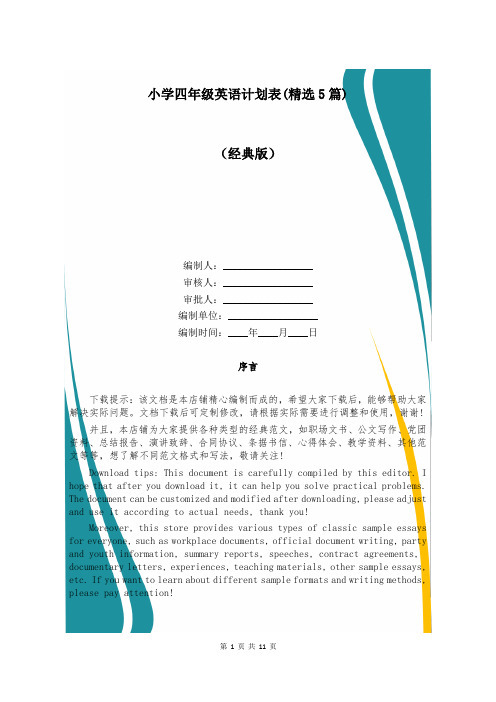
小学四年级英语计划表(精选5篇)(经典版)编制人:__________________审核人:__________________审批人:__________________编制单位:__________________编制时间:____年____月____日序言下载提示:该文档是本店铺精心编制而成的,希望大家下载后,能够帮助大家解决实际问题。
文档下载后可定制修改,请根据实际需要进行调整和使用,谢谢!并且,本店铺为大家提供各种类型的经典范文,如职场文书、公文写作、党团资料、总结报告、演讲致辞、合同协议、条据书信、心得体会、教学资料、其他范文等等,想了解不同范文格式和写法,敬请关注!Download tips: This document is carefully compiled by this editor. I hope that after you download it, it can help you solve practical problems. The document can be customized and modified after downloading, please adjust and use it according to actual needs, thank you!Moreover, this store provides various types of classic sample essays for everyone, such as workplace documents, official document writing, party and youth information, summary reports, speeches, contract agreements, documentary letters, experiences, teaching materials, other sample essays, etc. If you want to learn about different sample formats and writing methods, please pay attention!小学四年级英语计划表(精选5篇)时间就如同白驹过隙般的流逝,我们的工作与生活又进入新的阶段,为了今后更好的发展,写一份计划,为接下来的学习做准备吧!计划为我们提供了一个清晰的方向,帮助我们更好地组织和管理时间、资源和任务。
四年级英语寒假计划表

四年级英语寒假计划表
寒假时间:2023年1月15日至2023年2月15日
一、学习目标
1.巩固所学知识,提高英语听说读写能力。
2.掌握英语基础语法,增强英语语感。
3.提高词汇量,扩充阅读量。
4.提高英语实际运用能力,为新学期学习做好准备。
二、学习安排
1.每日晨读30分钟,朗读已学过的课文和单词。
2.每天完成一张寒假作业,复习巩固本学期所学内容。
3.每周听录音练习英语口语,培养英语语感。
4.每周阅读一篇英文短文,增加词汇量和阅读量。
5.每周复习和预习新学期即将学习的内容。
三、学习要求
1.坚持每天完成学习任务,不拖延、不懈怠。
2.每天总结所学内容,巩固所学知识。
3.遇到问题及时请教老师或同学,不要不懂装懂。
4.每天朗读英语课文和单词,培养英语语感。
5.每周完成老师布置的作业,认真对待每一项作业。
四、学习奖励
1.寒假期间表现优秀的学生将获得老师颁发的奖状和奖品。
2.学习进步明显的学生将获得老师和家长的表扬和鼓励。
3.寒假作业完成优秀的学生将获得老师和家长的肯定和赞赏。
四年级上册英语计划表大全
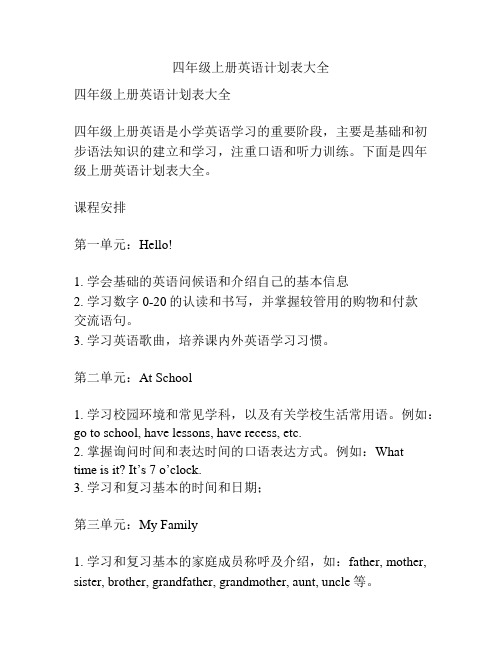
四年级上册英语计划表大全四年级上册英语计划表大全四年级上册英语是小学英语学习的重要阶段,主要是基础和初步语法知识的建立和学习,注重口语和听力训练。
下面是四年级上册英语计划表大全。
课程安排第一单元:Hello!1. 学会基础的英语问候语和介绍自己的基本信息2. 学习数字0-20的认读和书写,并掌握较管用的购物和付款交流语句。
3. 学习英语歌曲,培养课内外英语学习习惯。
第二单元:At School1. 学习校园环境和常见学科,以及有关学校生活常用语。
例如:go to school, have lessons, have recess, etc.2. 掌握询问时间和表达时间的口语表达方式。
例如:Whattime is it? It’s 7 o’clock.3. 学习和复习基本的时间和日期;第三单元:My Family1. 学习和复习基本的家庭成员称呼及介绍,如:father, mother, sister, brother, grandfather, grandmother, aunt, uncle等。
2. 学习有关身体部位的词汇,复习基本的语音规律;3. 学习表达自己的家人及家庭的特点。
第四单元:My Home1. 学习和复习基本房屋和家具的名称。
2. 学习和复习基本的方位介词,如:in, on, under, behind等。
3. 学习和复习常见房屋、家具及环境的描述语言;第五单元:Food and Drinks1. 学习和复习日常食品和饮料的名称,以及饮食和餐桌礼仪的知识。
2. 学习和复习基本计量器具和数量词,如:a cup of, a glass of,a bottle of, a box of, a can of等。
3. 学习和复习如何用英语点餐、结账、表达偏好和反感食品等语言。
第六单元:Sports and Hobbies1. 学习和复习常见的体育运动和休闲爱好,以及表达自己的兴趣和爱好。
小学英语学习计划思维导图
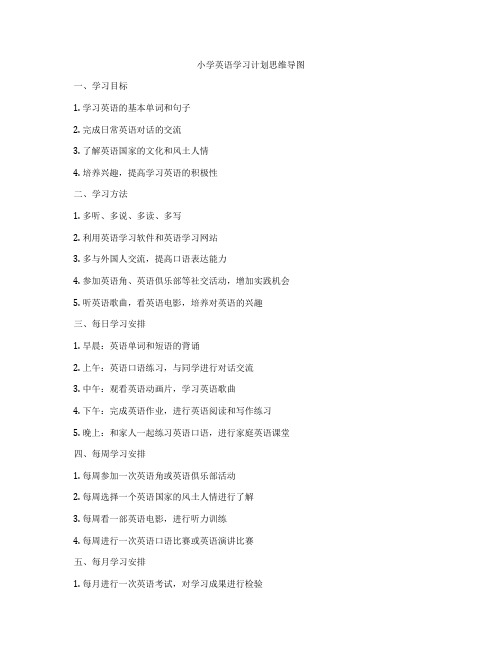
小学英语学习计划思维导图
一、学习目标
1. 学习英语的基本单词和句子
2. 完成日常英语对话的交流
3. 了解英语国家的文化和风土人情
4. 培养兴趣,提高学习英语的积极性
二、学习方法
1. 多听、多说、多读、多写
2. 利用英语学习软件和英语学习网站
3. 多与外国人交流,提高口语表达能力
4. 参加英语角、英语俱乐部等社交活动,增加实践机会
5. 听英语歌曲,看英语电影,培养对英语的兴趣
三、每日学习安排
1. 早晨:英语单词和短语的背诵
2. 上午:英语口语练习,与同学进行对话交流
3. 中午:观看英语动画片,学习英语歌曲
4. 下午:完成英语作业,进行英语阅读和写作练习
5. 晚上:和家人一起练习英语口语,进行家庭英语课堂
四、每周学习安排
1. 每周参加一次英语角或英语俱乐部活动
2. 每周选择一个英语国家的风土人情进行了解
3. 每周看一部英语电影,进行听力训练
4. 每周进行一次英语口语比赛或英语演讲比赛
五、每月学习安排
1. 每月进行一次英语考试,对学习成果进行检验
2. 每月与外国人进行一次网络交流,提高英语口语表达能力
3. 每月选定一个英语国家的节日进行了解和庆祝
4. 每月进行一次英语文化体验活动,如英语剧场观赏、英语展览参观等
备注:以上学习安排仅供参考,具体学习情况还需根据学生的实际情况进行调整和完善。
小学英语学习计划表

千里之行,始于足下。
学校英语学习方案表学校英语学习方案表为了提高学校生的英语水平,培育他们的英语学习爱好和力量,制定一份学校英语学习方案表格外必要。
以下是一份学校英语学习方案表,旨在挂念学校生系统地学习英语。
学习目标:1. 提高学校生的英语听说力量;2. 学习基本的英语词汇和语法;3. 增加英语阅读和写作的练习。
周一至周四:每天早晨练习:1. 听英语歌曲:每天早晨放一首简洁的英语歌曲,让学校生学习英语的语音和节奏。
每天下午练习:1. 基本词汇学习:每天学习5个基本的英语单词,例如:apple(苹果)、cat(猫)、dog(狗)、book(书)等。
学习新单词的拼写和发音,并加以复习。
周五:第1页/共2页锲而不舍,金石可镂。
1. 复习本周学习的词汇:通过玩耍、拼图或图片等形式来巩固本周学习的词汇。
周末:1. 阅读时间:每天读一篇简短的英语故事,并理解故事的简洁内容。
可以每周更换故事的主题,例如动物、家庭等。
同学也可以选择自己宠爱的英语故事来阅读。
2. 写作练习:每天写一篇简短的英语日记,描述自己的一天或周末的活动。
可以借助图片或拼图来挂念写作。
留意事项:1. 每天坚持听英语歌曲,让同学接触标准的英语发音和节奏;2. 词汇学习不仅仅要学习单词的拼写和发音,还要培育同学的词汇记忆力量;3. 阅读时间可以选择适合学校生程度的英语故事,激发他们对英语的爱好;4. 写作练习可以依据同学的程度适当调整难度,不要使同学感到压力太大。
学校英语学习方案表就是如上的内容,通过制定周一至周四和周末的学习方案,挂念学校生系统地学习英语,培育他们的英语听说力量、词汇记忆力量、阅读力量和写作力量。
同时,学习方案中的留意事项也能挂念老师和家长更好地指导学校生的英语学习。
小学生英语学习计划

小学生英语学习计划目标:通过学习英语,我希望能够流利地读、写和说英语,掌握基本的语法和词汇知识,能够和外国朋友交流,了解世界各地的文化。
学习时间:每天晚上用于英语学习的时间为1-2小时,周末也会增加一些时间来复习和总结。
学习内容:1. 词汇学习计划:- 每天背诵5-10个新单词- 每周复习已学过的单词2. 语法学习计划:- 每周学习一个语法知识点,例如动词时态、名词复数等- 每天做一些相关的练习题3. 口语学习计划:- 每天练习朗读一篇短文- 和家人、朋友练习英语对话4. 听力学习计划:- 每周听一次英语广播或者英语歌曲,尝试理解其中的内容- 每天听英语短篇故事或者视频5. 写作学习计划:- 每周写一篇短文,描述自己的一天生活或者家乡的风景- 每天写一两个句子,练习表达自己的想法6. 阅读学习计划:- 每周阅读一本适合自己水平的英语小故事书- 每天阅读一些简单的英语文章或故事学习方法:1. 多听多说英语是一门语言,要想流利地掌握它,就必须多听多说。
可以通过和家人、朋友练习英语对话,朗读英语文章或者听英语广播来提高口语能力和听力水平。
2. 多读多写阅读能够帮助我们扩大词汇量和语感,写作可以锻炼我们的表达能力和语法水平。
因此,要多读多写,积累语言知识,提高我们的英语水平。
3. 坚持不懈学习语言是一个长期的过程,很多时候会遇到困难和挫折。
但是只要我们坚持不懈,定期复习和总结,一定会有所收获的。
每学期末我们会制定一个学习计划评估,看看自己在这段时间内取得了什么成绩,有哪些地方可以进一步加强。
希望通过这个学习计划,我能够在英语学习上取得明显地进步,达到我制定的学习目标。
小学生英语学习计划图

小学生英语学习计划图Title: Elementary School Student English Learning Plan IntroductionLearning a new language is an exciting and rewarding experience. For elementary school students, learning English opens up a world of opportunities for communication and connection with people from different cultures around the globe. In this learning plan, we will outline a comprehensive approach to English language learning for elementary school students.Goals1. To develop basic English speaking and listening skills.2. To build a foundation in English reading and writing.3. To foster a love for the English language and a curiosity about different cultures.Materials1. Textbooks and workbooks specifically designed for elementary school students.2. Audio-visual aids such as videos, songs, and interactive games.3. English storybooks and readers at appropriate reading levels for students.4. Flashcards and other visual aids for vocabulary building. Learning Plan1. Speaking and Listeninga. Introduce basic English greetings and conversations.b. Practice daily conversations such as asking for and giving directions, ordering food, and making introductions.c. Engage in role-play activities to simulate real-life conversations.d. Watch English videos and listen to English songs to familiarize students with the sounds and rhythm of the language.2. Readinga. Start with simple English stories and picture books to introduce students to English vocabulary and sentence structures.b. Provide opportunities for students to read out loud and practice pronunciation.c. Introduce comprehension exercises to ensure students understand the content of the reading materials.d. Gradually increase the complexity of reading materials as students' reading skills improve.3. Writinga. Teach students basic English writing skills such as forming letters, punctuation, and spelling.b. Introduce simple writing exercises such as writing short sentences, filling in the blanks, and completing simple stories.c. Engage students in creative writing activities, such as writing their own stories and keeping a daily journal in English.4. Vocabulary Buildinga. Introduce new English words through thematic units such as colors, numbers, animals, and daily activities.b. Use flashcards and other visual aids to reinforce vocabulary learning.c. Engage students in games and activities that involve the use of new vocabulary words.5. Cultural Explorationa. Introduce students to different English-speaking countries and their customs, traditions, and festivals.b. Share English stories, folktales, and myths from different cultures to foster an appreciation for diversity.c. Encourage students to explore and ask questions about the similarities and differences between their own culture and the cultures of English-speaking countries.Assessment and Feedback1. Conduct regular assessments to evaluate students' progress in speaking, listening, reading, and writing skills.2. Provide constructive feedback to students to help them improve their English language skills.3. Offer opportunities for students to practice their English in real-life situations, such as role-plays and conversations with English-speaking peers or adults.ConclusionBy following this comprehensive learning plan, elementary school students will have the opportunity to develop foundational Englishlanguage skills while fostering a love for the language and an appreciation for different cultures. With the right materials, activities, and guidance, students will be well on their way to becoming confident and proficient English speakers.。
小学生英语学习计划表

小学生英语学习计划表IntroductionAs an essential tool for learning English, a study plan can help young learners allocate their time systematically and keep track of their progress. This article provides a sample study plan tailored to elementary school students who are eager to improve their English proficiency.GoalsThe first step in designing a study plan is to set specific goals. In general, we suggest that elementary school students focus on the following four language skills: listening, speaking, reading, and writing. Here are some specific goals that students can strive for:1. Listening: Understand simple instructions and conversations related to daily activities.2. Speaking: Communicate basic needs, feelings, and preferences in English.3. Reading: Read and comprehend simple stories and passages with basic vocabulary and sentence structures.4. Writing: Write short sentences and paragraphs with correct spelling and punctuation.ScheduleNow that we have set clear goals for each language skill, we need to decide how much time to allocate to each activity. Here is a proposed weekly schedule that you may find helpful:Monday to Friday:1. Morning (30 minutes): Listen to an English song or podcast while having breakfast.2. Afternoon (60 minutes): Attend an English class or study online with a tutor.3. Evening (30 minutes): Watch an English cartoon or movie with English subtitles.Saturday:1. Morning (60 minutes): Review grammar and vocabulary with worksheets or flashcards.2. Afternoon (60 minutes): Practice speaking with a conversation partner or group.Sunday:1. Morning (60 minutes): Read a children's storybook or newspaper article and answer comprehension questions.2. Afternoon (60 minutes): Write a short paragraph or essay on a topic of interest with guidance from a teacher or parent.MaterialsTo achieve the goals identified above, students will need to use a variety of materials such as textbooks, workbooks, dictionaries, and multimedia resources. Here are some suggested materials that can aid your learning:1. Textbooks: Oxford Discover, Let's Go, Happy House, and Big English.2. Workbooks: English Time, Grammar Friends, and Fun for Starters.3. Dictionaries: Oxford Learner's Dictionary,Merriam-Webster's Elementary Dictionary, and Longman Dictionary of Contemporary English for Kids.4. Multimedia resources: YouTube, Kahoot, Quizlet, and Duolingo.Tracking ProgressTo make sure your study plan is effective, you need to monitor your progress regularly and adjust your strategies accordingly. Here are some ways to track your progress:1. Keep a journal or record book to note down the new words and phrases you learn each day, the difficulties you encounter, and the achievements you make.2. Take quizzes or tests regularly to evaluate your understanding of English grammar, vocabulary, and reading comprehension.3. Seek feedback from teachers, parents, or peers on your speaking and writing skills, and improve your weaknesses based on the feedback.ConclusionIn conclusion, a study plan is an essential tool for elementary school students who are learning English. By setting clear goals, allocating time systematically, using appropriate materials, and tracking progress regularly, young learners can achieve their language targets and enjoy the benefits of language proficiency.。
小学生英语学习计划简笔画

小学生英语学习计划简笔画目标:通过学习英语,能够流利地表达自己,更好地理解和使用英语。
一、每天的学习计划1. 早上:早上起床后,可以通过英语歌曲或者跟着英语视频学习一些简单的口语表达和日常用语。
2. 上午:上午时间可以进行英语听力和阅读练习,可以选择一些简单的英文故事、英语绘本或者英语听力材料进行听力和阅读练习。
3. 中午:中午可以利用午休时间进行英语口语练习,可以找一些小伙伴一起练习口语,进行英语闲聊。
4. 下午:下午可以进行英语写作练习,可以写一些英文日记、作文或者信件来提高写作能力。
5. 晚上:晚上可以通过看英语动画片或者英语电影来进行英语学习,可以跟着影视中的对话练习口语表达。
二、周末的学习计划1. 周六:周六可以安排一些英语游戏和英语活动,可以通过英语游戏、英语角或者英语俱乐部来进行英语学习和交流。
2. 周日:周日可以进行英语综合训练,可以复习以前学过的知识,巩固所学的英语知识。
三、在学校的英语学习计划1. 在学校英语课上,要积极参与课堂活动,认真听讲,积极回答问题,勤于表达英语思想。
2. 在课外时间,可以利用图书馆的英语学习资料,学习更多的英语知识,积极参与英语活动。
四、提高英语成绩的学习方法1. 多看英文书籍和英语杂志,积累英语词汇和表达方式。
2. 多听英文听力材料,提高听力和口语能力。
3. 多写英文作文,提高写作能力,锻炼用英语表达思想的能力。
四、考试备考计划1. 在备考期间,每天要按时进行复习,不断巩固知识。
2. 多做英语试题,对照答案找出自己的薄弱环节,加以提高。
3. 制定合理的备考计划,分配好时间,保证高效的备考。
通过以上的学习计划,相信在未来的学习中,同学们一定能够取得更好的英语成绩,更加自信地运用英语进行交流。
希望大家都能够坚持学习,不断进步,学习好英语!。
小学英语课程标准学期学习计划安排表

小学英语课程标准学期学习计划安排表Elementary English Curriculum Standard Semester Study Plan ScheduleIntroductionThe elementary English curriculum standard semester study plan is designed to provide a comprehensive framework for English language learning for students in elementary school. The plan is divided into two semesters, with specific learning objectives, topics, and activities outlined for each semester. This study plan aims to enhance students' English language skills, including listening, speaking, reading, and writing, in a systematic and structured manner.Semester 1The first semester of the elementary English curriculum standard study plan focuses on building a strong foundation in English language skills. The learning objectives for this semester include:- Developing listening comprehension skills through listening to short stories, songs, and conversations.- Practicing speaking skills by engaging in role-plays, conversations, and presentations.- Building reading skills by reading simple texts, poems, and short stories.- Developing writing skills through writing sentences, paragraphs, and short compositions.The topics covered in this semester include greetings, introductions, numbers, colors, animals, family, food, and daily routines. The activities planned for this semester include listening exercises, speaking drills, reading comprehension tasks, and writing practice. The semester will also incorporate games, songs, and multimedia resources to enhance student engagement and motivation.Semester 2The second semester of the elementary English curriculum standard study plan focuses on expanding students' English language skills and knowledge. The learning objectives for this semester include:- Improving listening comprehension skills through listening to longer texts, dialogues, and audio-visual materials.- Enhancing speaking skills by participating in debates, discussions, and dialogues.- Strengthening reading skills by reading passages, stories, and articles.- Developing writing skills through writing essays, reports, and creative pieces.The topics covered in this semester include seasons, weather, holidays, sports, hobbies, transportation, and professions. The activities planned for this semester include listening comprehension tasks, speaking activities, reading comprehension exercises, and writing assignments. The semester will also incorporate project-based learning, group work, and collaborative tasks to promote teamwork and creativity.ConclusionThe elementary English curriculum standard semester study plan provides a structured and comprehensive approach to English language learning for elementary school students. By following this study plan, students will be able to develop and enhance their English language skills in a systematic and progressive manner. The plan includes a variety of activities,resources, and topics to engage students and facilitate their language learning journey. This study plan aims to equip students with the necessary language skills and knowledge to communicate effectively in English and succeed in their academic and personal lives.。
小学英语学习计划表怎么写

小学英语学习计划表怎么写推荐文章小学生读书计划表热度:小学生如何制定暑假计划表热度:小学生时间计划表制定与培养热度:中学英语学习计划表怎么安排热度:中考英语学习计划表怎么写热度:学习英语,对于小学生来说,制定一个比较合理的英语学习计划,然后按照学习计划学习,就能有效的进行英语学习。
以下是店铺分享给大家的小学英语学习计划表,希望可以帮到你!小学英语学习计划表一、总则:1、坚持每天至少背50-100个单词。
没有一定的单词量,英语就不可能学好。
2、每天听写一篇文章,以此文章为中心,展开一天的学习。
3、听说读写译五项都要练,以听说为主,听说资料,可以选慢速英语。
4、求质不求量,把听写的文章彻底搞懂足矣,不要好大喜功,贪大贪快。
扎扎实实,按部就班,是学好英语的必经之路。
5、把零碎的时间充分利用起来学英语,不断地重复。
6、听写是个学习英语的好方法,要继续加强。
7、早睡早起学英语。
8、抓住一套教材足矣,不要盲目的更换教材,好教材,我选择新概念英语,每一篇都是经典。
9、每天学习英语必须要有详细可行的计划,必须坚决执行,没有任何借口。
10、相信自己,一定能够学好英语。
11、坚持每一天,充分利用一切可以利用的时间学英语。
没有持之以恒的学习和大量的时将做保障,一切都是空谈。
二、分则:(一)词汇:1、英语的学习还是需要一定单词量积累的,每天可以早晚各半小时用来集中背单词,最少也要保证早晚各15分钟,可以选新概念或四六级的词汇背,这些比较基础并且常用。
2、在阅读中或者看电影时遇到不认识的生词,你认为不错的就抄下来,可以制成小卡片或者摘抄在小本子上记忆。
(二)听力:1、除周末外,每天晚上10:00——12:00听写一篇五分钟左右的短文。
着重听力后的分析过程。
2、早晚都随身带MP3,一有空闲时间就反复听这篇短文,直到听烂为止。
3、周末看一部外国电影,复习就内容,检查一周来的学习计划执行情况。
4、重视精听,听无数遍。
(三)口语:1、朗读并努力复述听写的短文。
星期二英语学习计划小学

星期二英语学习计划小学Time: 8:00am-9:00amActivity: Reading ComprehensionGoal: To improve reading skills and comprehensionIn order to start the day off on the right foot, we will begin with a reading comprehension activity. The students will be given a short passage to read, and then they will answer questions based on the passage. This will not only help improve their reading skills, but also their understanding of the text.Time: 9:00am-10:00amActivity: Vocabulary BuildingGoal: To expand the students' vocabularyNext, we will move on to vocabulary building. We will introduce the students to a set of new words, and then we will have them use the words in sentences. This will help the students understand the meaning of the words and how to use them in context.Time: 10:00am-10:15amBreakTime: 10:15am-11:15amActivity: Spelling PracticeGoal: To improve spelling skillsAfter the break, we will move on to spelling practice. The students will be given a list of words to practice, and they will have to write each word multiple times. This will help them improve their spelling skills and become more familiar with commonly misspelled words.Time: 11:15am-12:00pmActivity: Grammar ReviewGoal: To reinforce grammar conceptsIn the last hour before lunch, we will review grammar concepts with the students. We will go over different parts of speech, sentence structure, and common grammar mistakes. This will help the students reinforce their understanding of grammar rules and improve their writing skills.Time: 12:00pm-1:00pmLunchTime: 1:00pm-2:00pmActivity: Writing PracticeGoal: To improve writing skillsAfter lunch, we will focus on writing practice. The students will be given a writing prompt and they will have to write a short story or paragraph based on the prompt. This will help the students improve their writing skills, as well as their creativity and imagination.Time: 2:00pm-3:00pmActivity: Listening ComprehensionGoal: To improve listening skillsNext, we will move on to listening comprehension. The students will listen to a short audio passage and then answer questions based on the passage. This will help improve their listening skills and their ability to understand spoken English.Time: 3:00pm-3:15pmBreakTime: 3:15pm-4:00pmActivity: Speaking PracticeGoal: To improve speaking skillsIn the last hour of the day, we will focus on speaking practice. The students will be given different speaking prompts and they will have to speak for a few minutes on each prompt. This will help improve their speaking skills and their confidence in using English.By following this Tuesday English learning plan, the students will have a well-rounded and comprehensive English learning experience. They will have the opportunity to work on reading, vocabulary, spelling, grammar, writing, listening, and speaking skills, all in one day. This will help them become more fluent and proficient in English, and they will be equipped with the necessary skills to succeed in their future language learning endeavors.。
(完整版)小学一二年级英语每周自我学习计划表
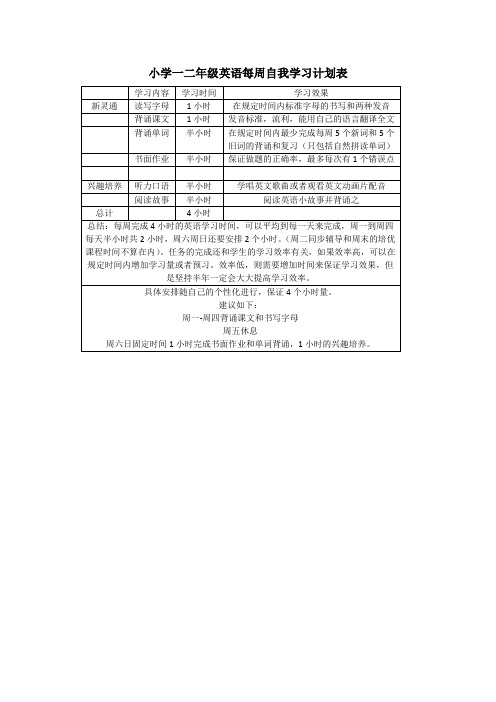
学习内容
学习时间
学习效果
新灵通
读写字母
1小时
在规定时间内标准字母的书写和两种发音
背诵课文
1小时
发音标准,流利,能用自己的语言翻译全文
背诵单词
半小时
在规定时然拼读单词)
书面作业
半小时
保证做题的正确率,最多每次有1个错误点
兴趣培养
听力口语
半小时
学唱英文歌曲或者观看英文动画片配音
阅读故事
半小时
阅读英语小故事并背诵之
总计
4小时
总结:每周完成4小时的英语学习时间,可以平均到每一天来完成,周一到周四每天半小时共2小时,周六周日还要安排2个小时。(周二同步辅导和周末的培优课程时间不算在内)。任务的完成还和学生的学习效率有关,如果效率高,可以在规定时间内增加学习量或者预习。效率低,则需要增加时间来保证学习效果,但是坚持半年一定会大大提高学习效率。
具体安排随自己的个性化进行,保证4个小时量。
建议如下:
周一-周四背诵课文和书写字母
周五休息
周六日固定时间1小时完成书面作业和单词背诵,1小时的兴趣培养。
- 1、下载文档前请自行甄别文档内容的完整性,平台不提供额外的编辑、内容补充、找答案等附加服务。
- 2、"仅部分预览"的文档,不可在线预览部分如存在完整性等问题,可反馈申请退款(可完整预览的文档不适用该条件!)。
- 3、如文档侵犯您的权益,请联系客服反馈,我们会尽快为您处理(人工客服工作时间:9:00-18:30)。
小学英语学习计划表篇一:如何做好小学英语学习计划如何做好小学英语学习计划来源:e度论坛 XX-10-08 15:38:11乐加乐英语:英语学习的起始时间越来越早,很多小学在一年级就已经开设了英语课。
但是很多小学生在学校开设英语课时并没有做好充足的思想准备,更没有良好的学习习惯,方法不当,学生会觉得越学越枯燥,导致了小学生对英语产生了厌烦甚至畏惧的心理。
对小学生而言学习英语究竟有什么好的良策呢以发挥小学生自身条件为基础,结合英语学习的一些规律,就能找到适合他们的英语学习方法,达到事半功倍的效果。
一、以兴趣为契机,多结合生活实际,学会运用语言初学英语阶段,意识还处于感性阶段,老师会千方百计地在课堂上激发培养小学生的学习兴趣,如通过做游戏、唱儿歌、画图画等小学生喜闻乐见的形式来调动学习热情和积极性,让小学生明白学习英语是件很有趣的事情。
二、注意良好学习习惯的养成1、倾听的习惯。
2、养成规范书写的习惯。
3、养成正确记忆单词的习惯。
三、注重积累,搜寻有效的记忆方法。
记忆在英语学习中占有重要地位,记忆方法直接关系到英语学习的成败。
小学生是初学者对于单词的记忆还知识处于感性阶段,如能引导得当,能发挥他们记忆的潜能。
很多人说在阅读中背单词,但那是需要一定的单词量作为基础才行。
虽然阅读很重要,但集中精力专门背单词还是必须的,否则单词量太少,阅读就完全失去了兴趣。
我们学习我们的母语,尚需要专门的记生词和生字。
可以使用单词记忆方法记忆,笔者曾体验过“表音密码”这个方法。
这个方法最大的好处就是记忆的效果特别好,它的原理具体我也说不清楚,一开始用觉得这方法挺一般的,没什么特别的,但是体验完到后来(你试个几天),你就会发现很神奇了,它真的能让你做到见词能读、听词能写。
并且从此大量的单词不再是问题。
这对于大量词汇记忆来说是非常关键的。
四、持之以恒,把握未来。
学习英语要过许多关,如语音关、开口关、拼读关、朗读关、默读关、快读关、词汇记忆关、句型转换关、情景说话关、快速听写关等。
过每一关都要下够功夫,练够火候,才能苦尽甘来。
以下六点是重点1. 上课时间一定要充分把握2. 坚持大声朗读课文,可改善自己的语音,语调3. 通过学习课文,在课余时间翻译课文4. 对于每课的语法重点,要适时总结,细致分析5. 需要背诵的课文一定要能默写6. 可选购一本符合自己能力的辅导书,每天适当练习篇二:三年级英语下册计划表精河县第二小学教学计划表(XX —XX学年第二学期)篇三:小学生英语学习计划(一)复习的内容:1.单词、词组尽可能让每个学生过关。
2.把课文中的重点句,按单元课文的顺序进行语法归类,做一些专项训练,特别是多训练根据上下文完成对话,看图完成对话,首字母填空和根据中文完成句子的题型。
3.加强听力、口头和笔头练习。
4.每两个单元进行练习,然后进行综合练习。
5.及时评讲,及时改正,及时补差,使每个学生在原有基础上有所提高。
复习基本可以分为三个阶段,每一个阶段都应各有侧重。
第一阶段以教材为本,侧重于教材的复习与梳理,从Unit 1到Unit 5,快速地过一遍,通过教材的重现来归纳语言点,讲透语言点运用,对各单元的知识要点进行梳理,同时应注意基础单词、词组、句型的过关,让学生对所学的英语知识进行“查漏补缺”。
复习教材上的对话和课文是最基础的复习,可以帮助回想所学过的知识点,可以让学生印象更加深刻。
第二阶段进行横向复习,做到点面结合。
如果说第一阶段是点的复习的话,那么第二阶段就是面的复习。
第一阶段着重要求学生对每个知识的过关,那么在第二阶段根据各知识点的前后联系将散落于各册书中的语言点进行整体归纳、小结,帮助学生构建紧密联系的“知识串”。
例如,我们复习代词的时候,我们可以连串地复习人称代词的主格、宾格形式,形容词性物主代词和名词性物主代词,让学生通过对比观察归纳这几类代词的不同用法。
这一阶段的复习中,教师要防止简单的重复,避免面面俱到,应当遵循精讲多练的原则,让学生通过听讲进一步加强理性认识,通过练习在实践中掌握。
先把知识点进行梳理整合,并结合前一轮复习中学生感到较困难的知识点进行以讲练为主的复习,使学生学会有规律地学习。
(一)、音标。
独立地进行音标的归纳复习。
第一教时解决元音字母的发音规律,第二教时解决常见的字母组合的发音规律,形式为读,思,归纳强化和练习。
(二)、时态。
对于一般现在时,一般过去时,一般将来时和现在进行时这四种时态进行归类比较复习。
1.一般现在时态概念:表示经常发生的或习惯性的动作或目前的状态。
规律:一般用动词原形,当主语为第三人称单数的一般现在时,动词要加s , es , 标志性的单词:always , usually , often , sometimes 如:She usually goes to school on foot2.现在进行时态概念:表示说话时正在发生或进行着的动作。
规律:be + 动词 ing 形式.标志性的单词:look , now , listen 如:Look , the boy is playing football .3.一般将来时态概念:表示将来发生的动作或情况。
规律:be going to do , will do . 标志性的单词:tomorrow , the day after tomorrow , next Sunday 如:Mr Brown is going to visitHong Kong tomorrow .4.一般过去时态概念:表示过去某一时刻或某一时间内发生的动作或情况。
标志性的单词:yesterday , last Monday , before , ago, the day before yesterday 规律:(1)一般情况动词后面加ed ;如:worked , cleaned , washed ,(2)以不发音e结尾的动词加d就要以了;如:lived , moved ,loved(3)以辅音加y结尾的动词把y改成i再加ed ;如:study– studied , carry—carried(4)重读闭音节的动词要双写末尾的辅音字母再加ed;如:stop—stopped shop—shopped skip--- skipped (5)特殊变化:见不规则动词表。
(三)、介词。
英语中介词的用法也较复杂,故安排一课时专门对介词的用法进行整理归类,并结合针对性较强的练习加以巩固。
(四)、阅读。
进行阅读练习的方法指导并结合相应的阅读材料进行专门训练。
(五)、听力。
听力非一日之功,所以我们将听力练习分散安排在每一课时中。
(六)、口语话题。
小学阶段的口语话题,其实就是一些简单句子的堆砌,它不同于我们的中文作文的写作要求和难度,一般要求8--10句话,50个单词左右。
我们将选出八篇范文(写人物、写生日、描写季节等等),让学生仿说仿写。
所以同学们不需要畏惧口语,只要你肯努力,尝试着去说说写写写,一定能在现有基础上提高你的英文口语和写作水平。
第三阶段的复习,我侧重对做题技巧的讲解和做一些学生易出错的题目,指导学生掌握一些做笔试和听力题的要领。
比如做听力题听问句找答句时,教学生在准备时先把每题的三项选择作比较反过来推敲它们答句的不同,在听的时候可以事半功倍的找到相应答案。
在做辩音题时,可以用延长读音或代读法来做,单项选择可以用排除法来做等等,通过分析让学生掌握每题的做题技巧。
当然,在复习的最后阶段,对于重难点、易混淆、易出错的语言点, 教师还应多加复习指导和练习,再拿出来跟学生细嚼,让他们重点消化吸收。
在复习的过程中,我们还要还应注意对学生英语能力的培养,进行听、说、读、写的全面训练,注重培养学生语言交际时的语感、对语篇的理解能力以及能运用所学的英语知识解决实际生活中的实际问题。
从而培养学生综合运用语言的能力。
篇四:PEP小学英语五年级上册教学计划及进度表(表格式)PEP小学英语五年级上册教学计划一、学生情况分析五年级的学生已经接触了两年英语,有一定的英语基础。
儿童的特性使得他们活泼好动,对新事物有着强烈的好奇心,探索知识的欲望很强烈,并且有着很强的表现欲。
由于我所教的三个班学生英语基础各不相同,有的班上学期就出现了两极分化严重的现象,所以本学期我将采用小组合作形式进行教学,根据学生四年级学习程度分组进行一帮一活动,保持并提高学生学习英语的兴趣,同时在小组成员间互帮互学的过程中提高学生间的团队协作意识。
二、教材分析本教材难易度合理,过渡平和,主要采用的是全身反应(Total Physical Response)教学法,让学生在不同的学习活动中感知并运用英语。
本教材按照每单元三课时编排,每单元包含九个部分:第一部分是全单元的的主要句型、单词等语言材料及其功能的集中展示;第二部分是主要句型和单词的重点板块;第三和第四部分是巩固知识的活动板块;第五部分是阅读,是对前面的拓展;第六部分是学生间合作活动,大多是两人组活动,以便学生应用语言;第七部分是读写部分;第八部分是拼读部分;第九部分是娱乐部分。
教材的设计体现了“以人为本”的教育思想,形式多样活泼,很符合该年龄阶段的儿童。
三、教学目标1.能听说读写92个单词或短语以及13组句子和9个单句。
要求能在真实语境中正确运用并能读懂简短语篇。
2.能听说认读16个单词。
3.能学会6个手工制作。
4.能听懂会唱8首歌曲。
5.能听懂会吟唱12首歌谣。
6.能完成6个自我评价活动。
7.能理解6个幽默小故事。
8.能了解6项简单的中西方文化知识。
五、教学方法建议(1)词汇教学(Let’s learn)Let’s learn部分的词汇是围绕话题归类出现的。
与前四册不同的是,从五年级上册开始,Let’s learn中的部分或全部词汇要求学生做到听说读写四会掌握。
还可以在与学生的交流中自然引入新单词,让学生在理解词义的基础上朗读、拼读新词。
在交际中教学单词。
教师应力求在语言交流中教单词,用旧词联系新的语言,融会语言和词汇的教学。
不要为了教单词而教单词,也不要让学生死记,要把它放到具体的对话(句子)中学习。
(2).对话教学(Let’s talk Pair work Group work)本册教材浓缩了原有的情景会话,更突出了目标句型。
为给学生提供灵活运用语言的机会,这部分还提供可替换的内容。
为此,教师应做相应的调整。
教学注意事项:1、不应象Let’s talk中那样教,应降低要求,并不作要求全部会认读;2、write部分照样子“抄”并不是“写”,应该让学生自己扩展,运用到现实中去;3、可以表扬加鼓励写的好的同学可以少“写”;4、要从开始就培养学生良好的书写习惯。
(3)、阅读理解教学(Read and write )这部分的教学目标是:读懂对话或短文;完成检测学生理解程度的填充句子练习;听说读写四会掌握一组句子;完成一项综合运用语言的任务型语言活动。
